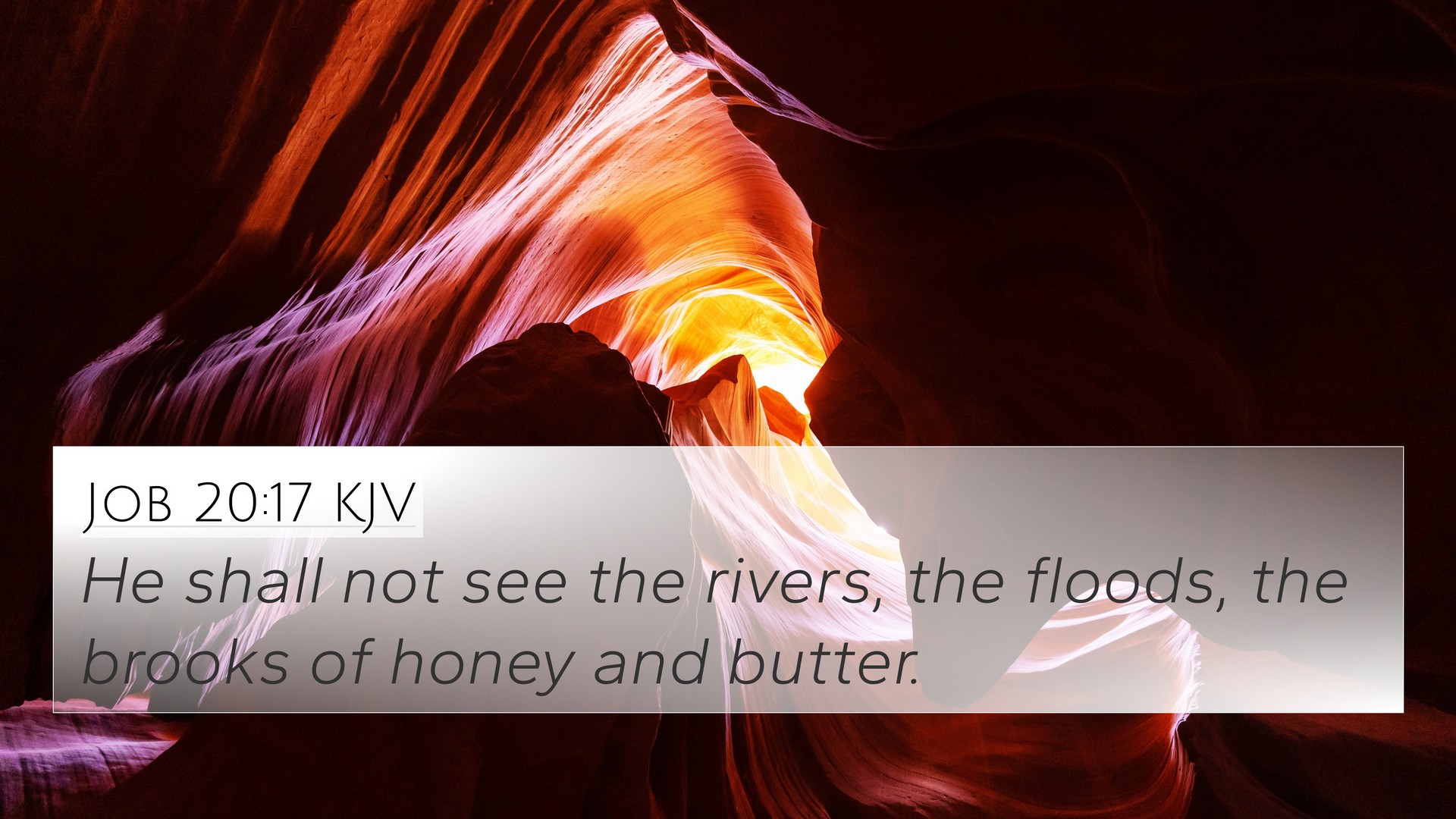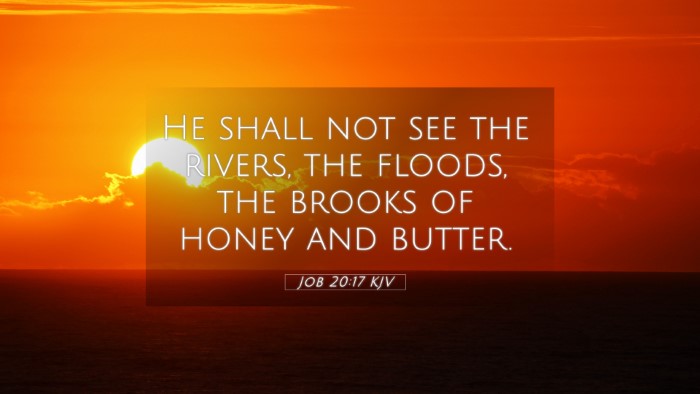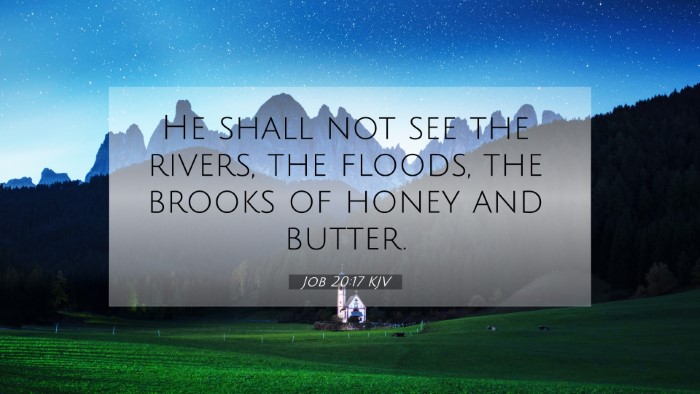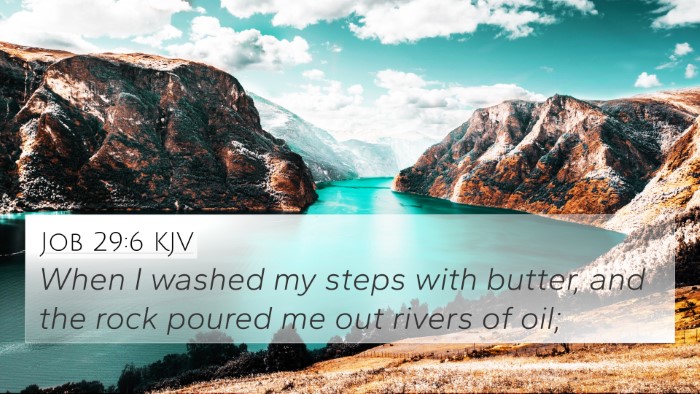Old Testament
Genesis Exodus Leviticus Numbers Deuteronomy Joshua Judges Ruth 1 Samuel 2 Samuel 1 Kings 2 Kings 1 Chronicles 2 Chronicles Ezra Nehemiah Esther Job Psalms Proverbs Ecclesiastes Song of Solomon Isaiah Jeremiah Lamentations Ezekiel Daniel Hosea Joel Amos Obadiah Jonah Micah Nahum Habakkuk Zephaniah Haggai Zechariah MalachiJob 20:17 Similar Verses
Job 20:17 Cross References
He shall not see the rivers, the floods, the brooks of honey and butter.
Uncover the Rich Themes and Topics of This Bible Verse
Listed below are the Bible themes associated with Job 20:17. We invite you to explore each theme to gain deeper insights into the Scriptures.
Job 20:17 Cross Reference Verses
This section features a detailed cross-reference designed to enrich your understanding of the Scriptures. Below, you will find carefully selected verses that echo the themes and teachings related to Job 20:17 KJV. Click on any image to explore detailed analyses of related Bible verses and uncover deeper theological insights.
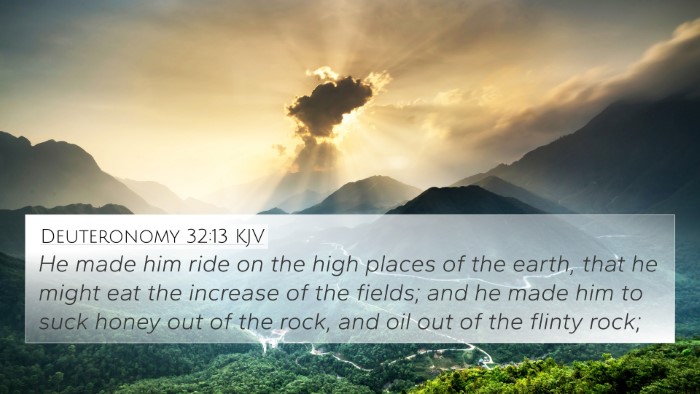
Deuteronomy 32:13 (KJV) »
He made him ride on the high places of the earth, that he might eat the increase of the fields; and he made him to suck honey out of the rock, and oil out of the flinty rock;
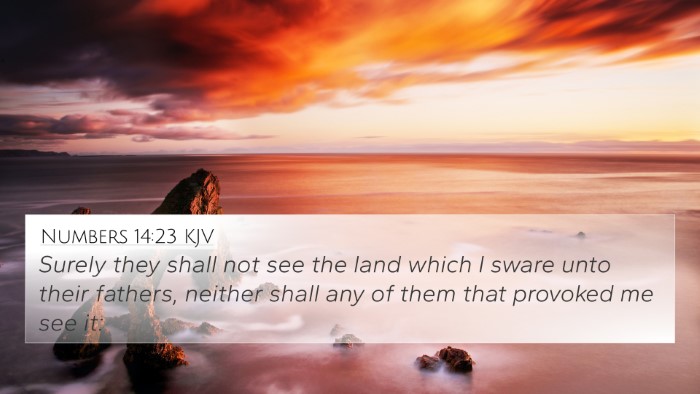
Numbers 14:23 (KJV) »
Surely they shall not see the land which I sware unto their fathers, neither shall any of them that provoked me see it:
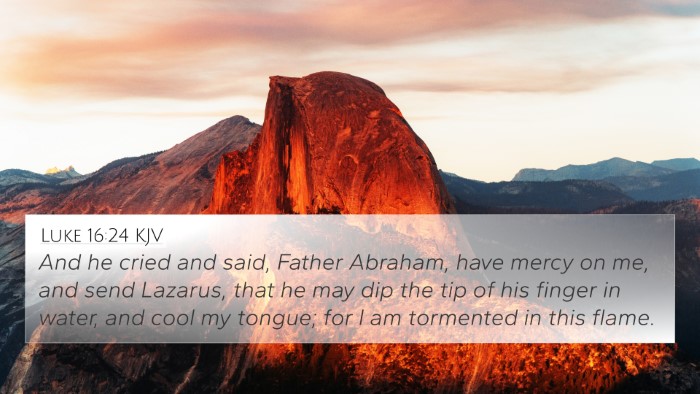
Luke 16:24 (KJV) »
And he cried and said, Father Abraham, have mercy on me, and send Lazarus, that he may dip the tip of his finger in water, and cool my tongue; for I am tormented in this flame.
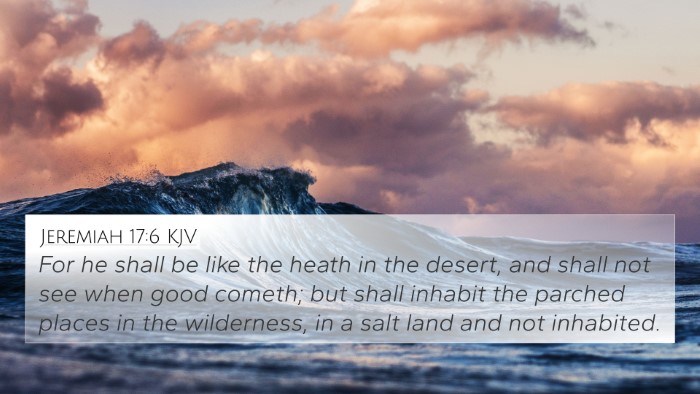
Jeremiah 17:6 (KJV) »
For he shall be like the heath in the desert, and shall not see when good cometh; but shall inhabit the parched places in the wilderness, in a salt land and not inhabited.

Isaiah 7:22 (KJV) »
And it shall come to pass, for the abundance of milk that they shall give he shall eat butter: for butter and honey shall every one eat that is left in the land.
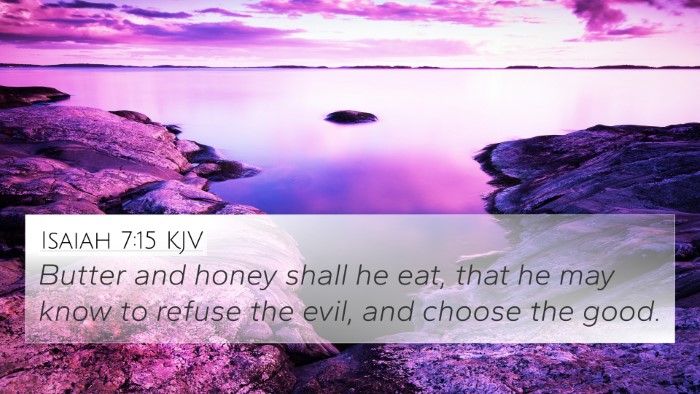
Isaiah 7:15 (KJV) »
Butter and honey shall he eat, that he may know to refuse the evil, and choose the good.
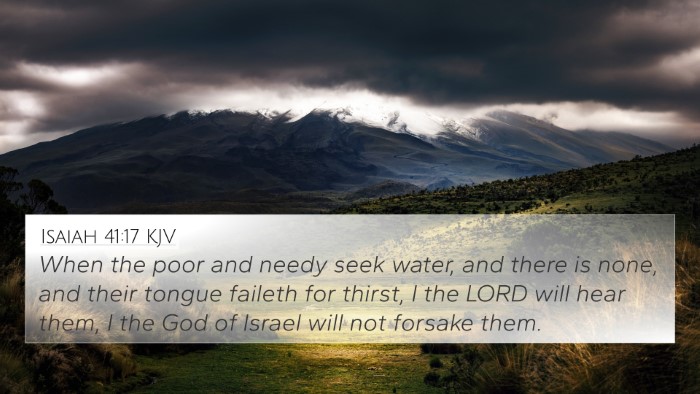
Isaiah 41:17 (KJV) »
When the poor and needy seek water, and there is none, and their tongue faileth for thirst, I the LORD will hear them, I the God of Israel will not forsake them.
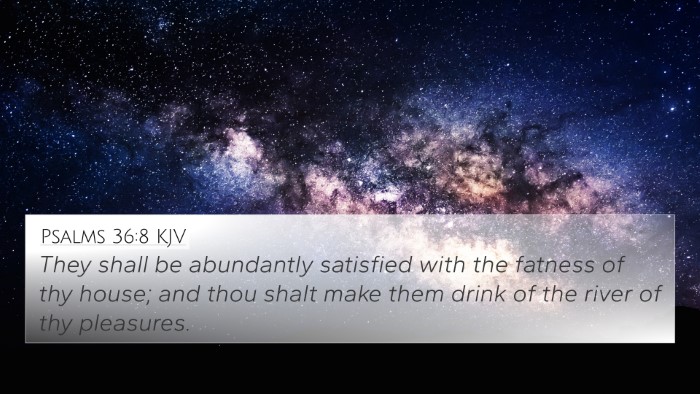
Psalms 36:8 (KJV) »
They shall be abundantly satisfied with the fatness of thy house; and thou shalt make them drink of the river of thy pleasures.
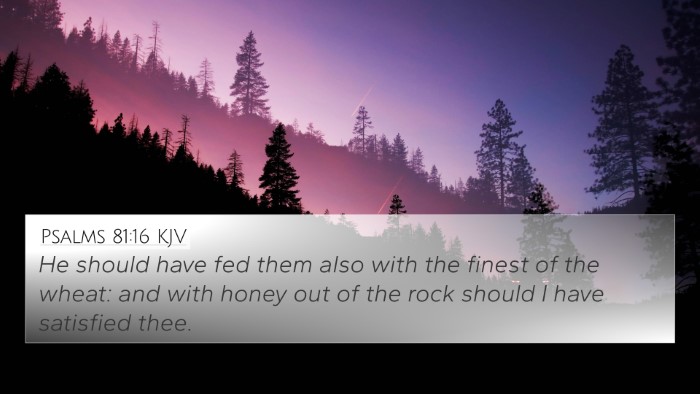
Psalms 81:16 (KJV) »
He should have fed them also with the finest of the wheat: and with honey out of the rock should I have satisfied thee.
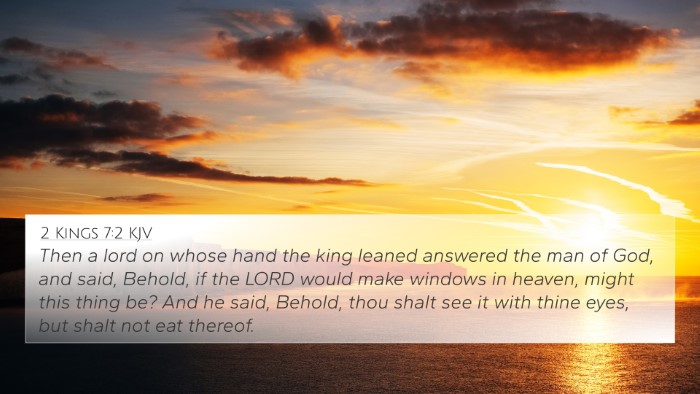
2 Kings 7:2 (KJV) »
Then a lord on whose hand the king leaned answered the man of God, and said, Behold, if the LORD would make windows in heaven, might this thing be? And he said, Behold, thou shalt see it with thine eyes, but shalt not eat thereof.
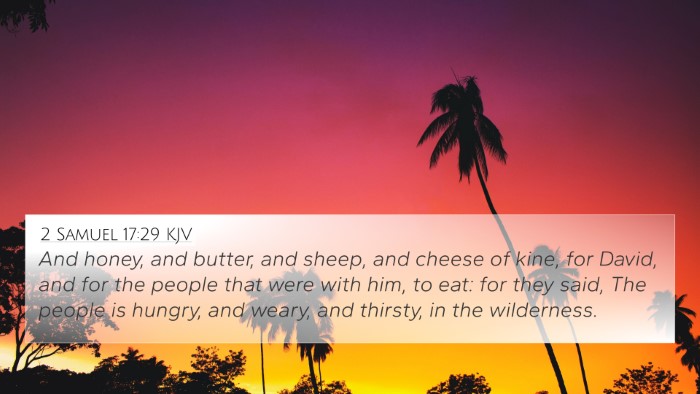
2 Samuel 17:29 (KJV) »
And honey, and butter, and sheep, and cheese of kine, for David, and for the people that were with him, to eat: for they said, The people is hungry, and weary, and thirsty, in the wilderness.
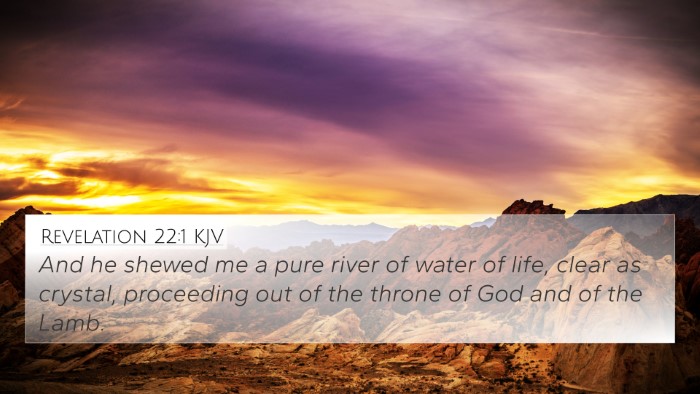
Revelation 22:1 (KJV) »
And he shewed me a pure river of water of life, clear as crystal, proceeding out of the throne of God and of the Lamb.
Job 20:17 Verse Analysis and Similar Verses
Understanding Job 20:17
Job 20:17 reads: "He shall not see the rivers, the floods, the brooks of honey and butter." This verse is part of Zophar’s response to Job, addressing the fate of the wicked and emphasizing their impending destruction. Below, we summarize the meaning of this verse by combining insights from respected public domain commentaries, specifically those by Matthew Henry, Adam Clarke, and Albert Barnes.
Context of the Verse
Job 20:17 fits into a larger discourse where Zophar expresses his views on the transience of wickedness and the ultimate justice of God. Job's friends continuously assert that his suffering must be a result of his sin, and Zophar is particularly forceful in this accusation.
Insights from Commentaries
-
Matthew Henry's Commentary
Henry suggests this verse illustrates the ephemeral nature of earthly pleasures and how they are denied to the wicked. He points out that just as rivers and streams symbolize abundance, the wicked, though they may seem to prosper temporarily, will eventually be cut off from such blessings.
-
Albert Barnes' Notes
Barnes interprets the rivers, floods, and brooks as representations of life-giving and sustenance. His analysis reflects how the wicked will not partake in the spiritual nourishment provided by God, indicating a profound sense of loss. He emphasizes the spiritual meaning behind the physical imagery of abundance denied to the wicked.
-
Adam Clarke's Commentary
Clarke takes a nuanced view, emphasizing the metaphorical aspect of the water imagery. He suggests that in the context of judgment, these elements represent happiness and prosperity which the wicked will never enjoy as a consequence of their actions. The verse serves as a stark warning about the fate of those who oppose God.
Thematic Bible Verse Connections
When analyzing Job 20:17, we can draw several connections to other Bible verses that reflect similar themes of judgment and the fate of the wicked:
- Psalms 1:4-5 - "The wicked are not so: but are like the chaff which the wind driveth away. Therefore the ungodly shall not stand in the judgment." This parallel emphasizes the instability of the wicked in contrast to the righteous.
- Proverbs 2:22 - "But the wicked shall be cut off from the earth, and the transgressors shall be rooted out of it." Here, the ultimate fate of the wicked is again affirmed.
- Isaiah 57:21 - "There is no peace, saith my God, to the wicked." This reinforces the theme of exclusion from God's blessings.
- Matthew 7:19 - "Every tree that bringeth not forth good fruit is hewn down, and cast into the fire." This illustrates the idea of judgment based on one’s actions.
- Romans 6:23 - "For the wages of sin is death; but the gift of God is eternal life through Jesus Christ our Lord." This verse connects the concept of sin leading to dire consequences.
- Revelation 21:8 - "But the fearful, and unbelieving, and the abominable, and murderers, and whoremongers, and sorcerers, and idolaters, and all liars, shall have their part in the lake which burneth with fire and brimstone." This speaks of the ultimate judgment awaiting the wicked.
- Lamentations 3:34-36 - "To crush under his feet all the prisoners of the earth, to turn aside the right of a man before the face of the Most High, to subvert a man in his cause, the Lord approveth not." Highlighting God’s justice and disapproval of the wicked’s trials.
Conclusion
Job 20:17 is a stark reminder of the justice of God and the consequences of wickedness. The imagery of exclusion from rivers and streams can be seen as both literal and symbolic, emphasizing the absence of joy and spiritual nourishment that the wicked will face. Understanding this verse and its connections through cross-referencing with related scriptures aids in grasping the larger narrative of judgment and grace found throughout the Bible.
Tools for Bible Cross-Referencing
For further exploration of these themes, tools such as a Bible concordance, Bible cross-reference guide, and Bible reference resources can assist in identifying connections between various scriptures. Understanding how to use Bible cross-references can deepen your study and enhance your understanding of the inter-Biblical dialogue surrounding themes of justice, judgment, and hope.
FAQs
- What verses are related to Job 20:17? This verse connects with many themes from Old and New Testament scriptures discussing judgment and the plight of the wicked.
- How do Job 20:17 and Psalms 1:4 connect? Both verses address the downfall of the wicked, highlighting their lack of stability and ultimate rejection.
- How can I identify connections between Bible verses? Utilizing a Bible concordance or cross-reference materials can help you find thematic and narrative links between verses.
